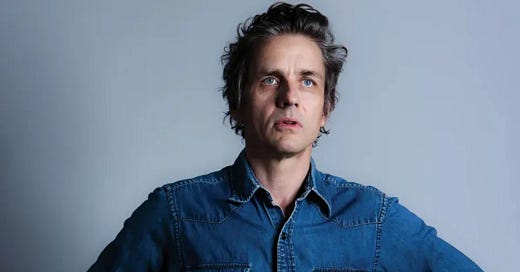Dean Wareham’s 2008 autobiography Black Postcards: A Rock & Roll Romance starts off in unusual fashion, with a quote from his old Galaxy 500 bandmate Damon Krukowski, who says he was shocked and disheartened one time in L.A. when Dean—who never moved in concert—suddenly stepped into a spotlight for a guitar solo. Although Krukowski didn’t like it, Wareham was taking the moment to step out from his first band and soon launch into his infinitely better band Luna, one of my all-time favorites.
Black Postcards then transitions into funny tales from Wareham’s childhood in New Zealand and Australia—although he always had U.S. roots, including a great-great grandfather who served in the Civil War. Little Dean had a third-grade girlfriend whose face he mash-kissed before they showed each other their private parts, he told on his brother for stealing from a little store, and his first memories of music were songs by The Seekers such as “Georgie Girl” and “A World of Our Own.” Good tunes, yes, but lucky for all of us with older brothers and influential music collections, Dean’s brother had records by Lou Reed and David Bowie, which set Dean excellently on his course.
In 1977, he moved to Manhattan, where he was soon experiencing all the now-legendary punk glory of that place and time. His favorite band became the Talking Heads. In 1981, Wareham headed for Harvard with Krukowski and, on his first night there, dropped acid and explored the campus. He formed his first band that first semester, even though nobody knew how to play or even had instruments. They borrowed a fellow student named Conan O’Brien’s drum set and proceeded to get last place in every category of a battle of the bands contest.
Wareham spends a couple of chapters discussing his dabbling in LSD—a drug not really much in fashion anymore at this point in the 1980s—and his loose involvement in Trotskyism—also not too in vogue at a time when many college students, if they were activist at all, were turning right rather than left. He graduated as a social studies major and moved to Germany with his girlfriend, where he read the books he was supposed to have read in college and got good on guitar.
Wareham eventually made his way back to New York City, where he worked a series of awful temp jobs and tried joining with several bands advertised in the Village Voice. One band he joined for a while had a drummer who drove into town in his Galaxy 500, a kind of auto he had never heard of before and the obvious inspiration for what would be his first popular band down the road. But with this earlier band, named Age of Reason, Wareham got to perform for the first time at CBGB, but at that performance, he realized the singer was a David Lee Roth-like clown and the rest of the group were idiots, and so he immediately quit.
At this point, Wareham realized it was fruitless to start a band by answering ads in the newspaper. He needed to start one with friends. Thus began Galaxie 500 with Krukowski and his long-time girlfriend Naomi, who didn’t even know how to play an instrument but volunteered to learn bass. But “sometimes your very limitations as players sets you apart from the crowd. Great guitar players are a dime a dozen.” When the couple moved back to Boston for their studies at Harvard, Wareham followed them to see where this band thing might lead.
The trio ended up working on a half-dozen songs that they recorded in producer Kramer’s studio (not the one from Seinfeld). Wareham writes, “Kramer later said he thought we were retarded when he first heard us bashing on those chords.” But the demo was enough to start getting the band some gigs, including one on a bill with Olympia, Washington’s Beat Happening. Galaxy 500 was very quickly signed to a record deal, made their first full-length called Today, and began squabbling about things like which songs should be on the album and how to credit the songwriting.
Things were happening for Wareham and Galaxy 500. Spin Magazine’s 1989 review of Today said it “contains the snazziest Velvet Underground revisionism since the Dream Syndicate’s debut” and Kramer told the band it was Thurston Moore of Sonic Youth’s favorite album of the year.





